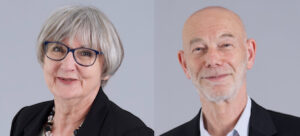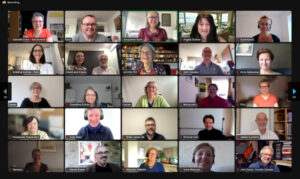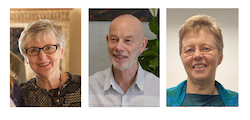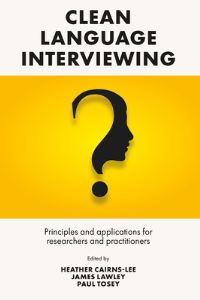First published in
The Work and Life of David Grove: Clean Language and Emergent Knowledge, Carol Wilson (Matador, 2017, pp.).
“Sing it out loud.
Sing it in your name.
Sing it like you’re proud.
Sing the healing game.”
The Healing Game, Van Morrison
(One of David Grove’s favourite songs)
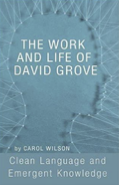
David Grove was a Character (with a capital C) who had a genius for innovating new ways to do therapy. He also had a remarkable generosity of spirit. This was exemplified in a metaphor he created while staying with us in London in 2002. One afternoon Caitlin Walker joined us in identifying metaphors for the role each of us wanted to play in the development of the clean community. David’s metaphor for himself was a “launch pad” from which others could lift off to discover new and unexplored worlds.
David had an ‘open source’ ethos. He never trademarked or registered Clean Language or any of his wonderful innovations. His suggestion to his students was always “take my work and make it your own”.
Once we had won David over with, as he put it, “Penny’s tenacious won’t-take-no-for-an-answer style and James’ inquiring, penetrating questions” he was completely supportive of our desire to produce a model of his work and to disseminate it to those who were interested. And it wasn’t just us – the same was true of everyone whose heart he could see was touched by his work.
Remarkably little of David’s prodigious output exists in published form since writing was not his forte. Among David’s gifts were his voice, his powers of observation, his focussed attention, his memory, and his love of the nuances and rhythm of the spoken word – no doubt derived in part from his Māori heritage. (The Māori language was not translated into the written form until 1820, although the symbolic meanings embodied in carving, knots and weaving has a much longer history.)
Carol Wilson is imbued with a similar generosity of spirit and showed remarkable fortitude in supporting David. She not only let him stay in her beautiful English thatched cottage from which he ran all manner of impromptu and experimental workshops, she worked with him to systematise some of his ideas into teachable processes for coaches and other facilitators.
Carol is one of the few people who managed to pin David down long enough to write about his work and to get it published. That is no mean feat when, as we know only too well, David never stood still for long. He developed ideas and processes at a pace that was hard to keep up with.
When David “chased an idea” he pursued it with every cell in his body. For instance, David stayed with us in 2003 and the night before he was due to leave the country he picked a book off of our bookshelf and started reading it. Nexus: small worlds & the groundbreaking science of networks was just the right book in the right place at the right time to stimulate David’s latest pursuit, Clean Space. The next morning he hadn’t finished the book and thoughtfully placed it back on the shelf before going to the airport. Imagine our surprise when two hours after leaving our home a taxi pulled up outside – containing David and all his luggage. He said he decided to miss the flight because he wanted to finish reading the book. He left his bags on the landing, and took the book to his room where he read it cover to cover – twice. He wouldn’t even come down to join us for meals, so we took him food on a tray for the duration.
—0—0—
The Work and Life of David Grove: Clean Language and Emergent Knowledge is a significant contribution to the field. It includes Carol’s work with David Grove between 2005 and 2007 and contains original transcripts of both his workshops and client sessions. Carol’s inclusion of others’ recollections and case histories adds richness and diversity. It reveals some pieces of the jigsaw of what David meant to those many, many lives he touched. And by not editing these contributors’ descriptions she demonstrates a congruence with David’s approach of preserving his clients’ exact words, and respecting each person’s subjective experience.
But Carol has done much more than than collate others’ work. She has documented a large number of David’s processes involving metaphor, Clean Language, Clean Space and those that come under the umbrella term, Emergent Knowledge. On top of that, her own cases studies show how she has applied Clean principles in real-world business situations.
We can think of no better way for Carol to honour David Grove’s memory than to have produced this book.
We’ll leave the last word to James Hillman, whose instruction for a life well-lived perfectly describes David Grove’s contribution:
All of us, each one of us, can and ought to give as much of himself as he possibly can – nay, to give more than he can, to exceed himself, to go beyond himself, to make himself irreplaceable.
Penny Tompkins and James Lawley
Waxahachie, Texas, 17 December 2014
Learning from a MasterOther articles by Carol Wilson on this site:
Six Degrees of Freedom
Emergent Knowledge and Clean Coaching
Metaphor & Symbolic Modelling for coaches


